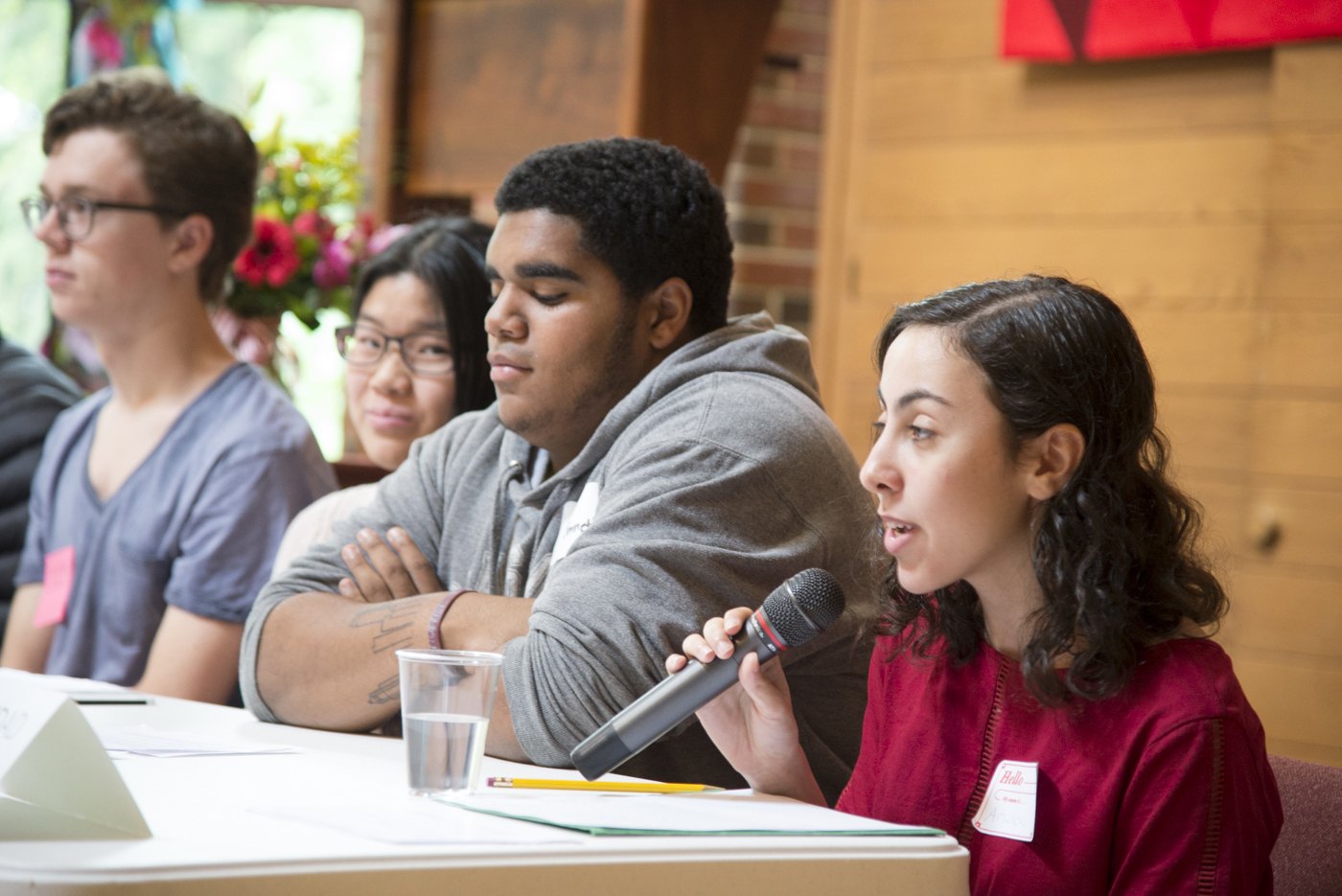When Arwa Mokdad walks into a room, there’s no immediate sign that the Mercer Island sophomore is of Islamic faith. She opts not to wear a hijab like many other Muslim girls, though not because she’s afraid to or disagrees with wearing the religious headdress.
Mokdad is actually very open about being Muslim.
“I’ve considered [wearing a hijab] on my own personal terms,” she said. “I just don’t identify with it. If I was to wear it, it would just be to identify with Islam to help answer more questions.”
Mokdad finds herself answering a lot of questions about her religion these days, which she encourages. Creating dialogue and having conversations that matter is something that Mokdad has worked very hard to initiate this year. Through her work with the Mercer Island Library’s Teen Advisory Board, Mokdad organized a panel called “Islam — What do you want to know?” which took place on the Island in April.
The event was one of several “Conversations for Strong Communities” Mokdad participated in through the board.
Teen services librarian Carrie Bowman said the board provides an opportunity for teens to step up, pursue something they’re interested in, plan a project and follow it through to its conclusion. In the last couple of years, Bowman said the teens have opted to focus on projects oriented with social justice.
“It was my goal to have a safe environment to do that sort of thing,” Bowman said. “And judging by the responses, I think it was.”
Bowman said Mokdad spearheaded the panel on Islam, choosing panelists, corresponding with them via email and assigning questions, while Bowman took care of the logistics.
“I wanted to just start a conversation to show people we can talk about this in a way without any blame without people getting angry and saying, ‘That’s a stereotype, you’re being offensive,'” Mokdad said. “I know it’s hard to just verbalize your thoughts. People get embarrassed and I’ve been in the same situation.”
Mokdad, who is half Yemeni and half Lebanese, has lived on Mercer Island since she was in third grade, when her parents moved from Georgia. She speaks Arabic fluently and says her interests include business, politics and journalism, and she one day plans to study law. Every summer, her family travels back to the Middle East, where her parents are originally from.
When asked if there’s a Muslim community on Mercer Island, Mokdad smiles and responds in earnest, “I think there’s one Muslim in my school.”
“I think being Muslim in Seattle is very nice because it’s a very liberal area and people are very accepting,” she said. “In general, being Muslim is kind of awkward. When you watch the news, there is a lot going on and people have a lot of questions. That’s why I had the panel, because people are very curious but it’s hard to start the dialogue.
“But with all the hate going on, it does get a little nerve-wracking at times.”
Mokdad said at her panel she was expecting to answer a lot of questions about terrorism, which she says is one of the first things people outside of her religion associate with it.
“Terrorists don’t represent Islam and what they’re doing has no basis in the Quran whatsoever,” she said. “That’s a completely different group and they’re not reflecting Muslims at all.”
As it turned out, most of the audience discussion centered on feminism among Muslims. She said the notion that Islam and feminism do not go together is “very problematic.”
“Feminism and Islam go hand-in-hand,” she said. “The prophet Muhammad was very much feminist. He sewed his own clothing, his wife proposed to him. His wife was a businesswoman and was literally his boss. He fought side-by-side with women. The Quran says men and women are equal, and any other view is not Islamic. Just point-blank, that’s not what the Quran is saying.”
Mokdad mentioned her mother as a big inspiration, saying she has always been a part of interfaith dialogues. From her mother, Mokdad said she learned how to respond to negativity with kindness. But following the news can be hard, as well as seeing how Muslims are portrayed through media.
“I think it’s very difficult to watch your religion just be torn apart and not being used correctly,” she said.
Through her efforts, Mokdad hopes to help dispel the stereotypes and stigmas Muslims face. She says she deals with negative comments here and there, though it often leads to an educational moment. Mokdad says such comments don’t come from malice, but simply from ignorance, which is why talking about race and religion is important.
“Right now in the United States, it is divided with racial tension and you can’t deny it anymore,” she said. “I think we need to talk about race because we’re not as united as we could be. There are so many issues that people of color are facing and we’re just not reacting to it the right way. It’s hard when we don’t understand what the other is facing. I think by discussing these issues and by understanding them, we’ll be able to connect more and we won’t be so filled with hate and fear.”


